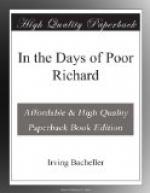“Now we kin skitter right long, but I tell ye we got purty clus to ’em back thar.”
“How did you know it?”
“Got a whiff o’ smoke. They was strung out from the pond landing over ’crost the trail. They didn’t cover the swamp. Must ‘a’ had a fire for tea early in the evenin’. Wherever they’s an Englishman, thar’s got to be tea.”
Before midnight they reached Remsen’s barn and about two o’clock entered the camp on lathering horses. As they dismounted, looking back from the heights of Brooklyn toward the southeast, they could see a great light from many fires, the flames of which were leaping into the sky.
“Guess the farmers have set their wheat stacks afire,” said Solomon. “They’re all scairt an’ started fer town.”
General Washington was with his forces some miles north of the other shore of the river. A messenger was sent for him. Next day the Commander-in-Chief found his Long Island brigades in a condition of disorder and panic. Squads and companies, eager for a fight, were prowling through the bush in the south like hunters after game. A number of the new Connecticut boys had deserted. Some of them had been captured and brought back. In speaking of the matter, Washington said:
“We must be tolerant. These lads are timid. They have been dragged from the tender scenes of domestic life. They are unused to the restraints of war. We must not be too severe.”
Jack heard the Commander-in-Chief when he spoke these words.
“The man has a great heart in him, as every great man must,” he wrote to his father. “I am beginning to love him. I can see that these thousands in the army are going to be bound to him by an affection like that of a son for a father. With men like Washington and Franklin to lead us, how can we fail?”
The next night Sir Henry Clinton got around the Americans and turned their left flank. Smallwood’s command and that of Colonel Jack Irons were almost destroyed, twenty-two hundred having been killed or taken. Jack had his left arm shot through and escaped only by the swift and effective use of his pistols and hanger, and by good luck, his horse having been “only slightly cut in the withers.” The American line gave way. Its unseasoned troops fled into Brooklyn. There was the end of the island. They could go no farther without swimming. With a British fleet in the harbor under Admiral Lord Howe, the situation was desperate. Sir Henry had only to follow and pen them in and unlimber his guns. The surrender of more than half of Washington’s army would have to follow. At headquarters, the most discerning minds saw that only a miracle could prevent it.
The miracle arrived. Next day a fog thicker than the darkness of a clouded night enveloped the island and lay upon the face of the waters. Calmly, quickly Washington got ready to move his troops. That night, under the friendly cover of the fog, they were quietly taken across the East River, with a regiment of Marblehead sea dogs, under Colonel Glover, manning the boats. Fortunately, the British army had halted, waiting for clear weather.




